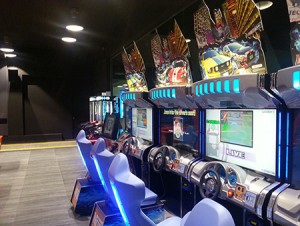What works in Middle Eastern family entertainment centres? The popular concept is by no means now universally applicable, it would seem. Paramount among the issues is whether the video game is, like the dinosaur, fading into oblivion.


THE universal acceptance is that the row of big, dedicated, interactive shooting/driving games is the ‘attract mode’ of the FEC, but in fairness few ever seem to be actually occupied while the rides, attractions and redemption certainly are… Is this a sign of the changing times in our business? Will the rest of the world follow suit?
The debate is led by Prakash Vivekanand, general manager at Amusement Services International and the principal distributor of all forms of games to the Middle East market. “It is sad that we are seeing a sharp decline in the video games business to a large extent. Many orders from locations opening with 100-plus games have fewer than 15 video games on their list. In effect the video segment is still exists in their shopping list, but in a much smaller percentage. We have seen this decline over the last three years”.
Vivekanand reckons that the revenue split within a typical FEC location today is 60 per cent on games that involve some kind of payout, such as redemption, merchandisers and novelty, carnival, midway, etc; 15 per cent on soft play, kiddie rides and other games for small children; 20 per cent for attractions and the rides sector, leaving five per cent or less on video games. The Middle East market has always been a mature redemption market, but the figures seem to indicate that games with payout dominates the cash box.
He is also quick to add that video games are necessary for the success of any FEC even though they do not yield high revenues per square foot as they cater to a certain age group of clients who may not be redemption inclined plus, they serve to increase dwell times in an FEC just as attractions do.
The space usually occupied by video games seems to have now been taken over by network gaming concepts that use Xbox and Playstation games in an exclusive teenager environment offering better value to the player. Two key Magic Planet locations in the UAE have created an exclusive network game area called Power League Gaming and this has now become an important addition to their business, with massive fan following via social media such as Twitter and Facebook. Players can keep themselves entertained at such PLG locations for about US$10 per hour. High definition screens, ‘funky’ headphones, high speed internet connections and, most importantly, the ability to co-operate or compete with other players in the same location or in other parts of the world seems to be the prime factors that draw players to such concepts. From an operator perspective, the infrastructure into a network concept is a one-time investment and beyond that investment, the operator only needs to invest on game software.
Read the full article in the May issue of InterGame.

